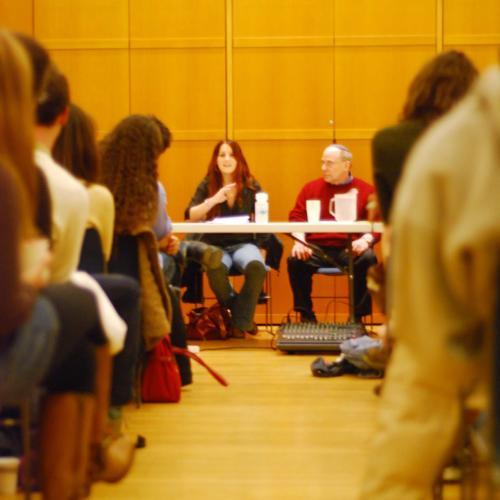
Harvard Hillel hosted a discussion last night with students who have served in the Israeli Defense Forces. The event took place on the final night of the “Breaking the Silence” photo and video exhibition.
Five former Israel Defense Force (IDF) soldiers debated “Breaking The Silence”—a controversial Harvard Hillel-hosted exhibit on the experiences of troops in the occupied Palestinian territories—during a panel yesterday evening.
The public event at Hillel invited four Harvard students who served in the IDF to discuss the exhibit with Oded Na’aman, a former IDF soldier presenting “Breaking The Silence” during its time in Boston, which ended Sunday. While some student panelists welcomed the exhibit, others criticized it for a lack of context and for portraying a negative image of Israel.
Shira Kaplan ’08—a panelist who said she served some of her “best two years” in Israeli intelligence—said the exhibit added to an existing mountain of anti-Israeli rhetoric.
“I apologize for saying this, but the truth is there are enough people out there, who are Arab or Muslim or whatever, who are doing this job [of criticizing Israel] for us,” she said. “It just misses the point and creates a negative image.”
Na’aman responded to such criticisms by saying that the exhibit was not about “human rights violations.” But panelist Asher A. Fredman ’08 said that when he went to the online Web site for the exhibit, the main headline he saw read “killing” and “murder.” Fredman said he could understand how a Harvard student audience without much background knowledge could take away a distorted image.
“Many people here, though smart, know little about the Israeli-Palestinian context,” Fredman said.
Near Eastern Languages and Civilizations Professor Ruth Wisse voiced a similar sentiment in a phone interview.
“Without a context, it tells exactly the opposite story of what it should be telling. The Arab war against Israel is now in its 60th year,” she said. “Soldiers who want to break the silence ought to remind us of why they have to be fighting in the first place, and that context is entirely missing from the exhibit.”
On the panel, Kaplan said the exhibit’s portrayal of Israel was unnecessarily critical, adding that it’s impossible to completely reconcile the security needs of Israel with the nation’s moral aims. “As long as there is an army in Israel, there will be moral problems,” she said.
But panelist Mishy Harman ’08 said the exhibit did not critique Israel itself.
“To me, there’s no greater expression of Zionism today than saying that Israel should be held to the highest moral standards possible,” Harman said.
After a well-attended opening night at the beginning of the month, “Breaking The Silence” received national criticism in a statement from Zionist Organization of America (ZOA) President Morton Klein, who said the exhibit projected an “anti-Israel” image.
In response to Klein’s criticisms, President and Director of Harvard Hillel Bernie Steinberg issued an open letter to Klein last Friday. The letter stated Harvard Hillel’s intent to not support the exhibit—which the Progressive Jewish Alliance hosted and sponsored—but rather to provide a venue in which it could be freely discussed.
Steinberg criticized Klein’s statements as inflammatory and divisive. “Don’t we Jews have enough enemies? Don’t you think it’s time that we stopped making enemies of each other?” the letter read.
Klein said in an interview yesterday that he intends to formally respond to Steinberg’s letter in a statement today and criticized Harvard Hillel for not adhering to the goals of National Hillel.
“It gives a clear credibility and legitimacy to this propaganda of falsehood by having it on the walls of Hillel, even if they said they didn’t sponsor it,” Klein said. “Would we have an open discussion about whether the holocaust happened or whether slavery existed in America?”
Jacob M. Victor ’09, president of Harvard Students for Israel (HSI) and a Crimson editorial writer, said that while most of HSI is “uncomfortable with the exhibit,” Klein is a “fringe figure in this entire debate.”
“[HSI] is probably closer to the ZOA on the political spectrum, but the vast majority of our members and the vast majority of pro-Israel people in America would disagree on the stance he’s taken on this,” Victor said. “Pretty much everyone in our organization is a proponent of free expression.”
“It’s only when outside organizations get involved that it becomes a divisive issue,” he said.
—Staff writer Vidya B. Viswanathan can be reached at viswanat@fas.harvard.edu.
Read more in News
Lincoln Day Dinner Sees Record Crowd












